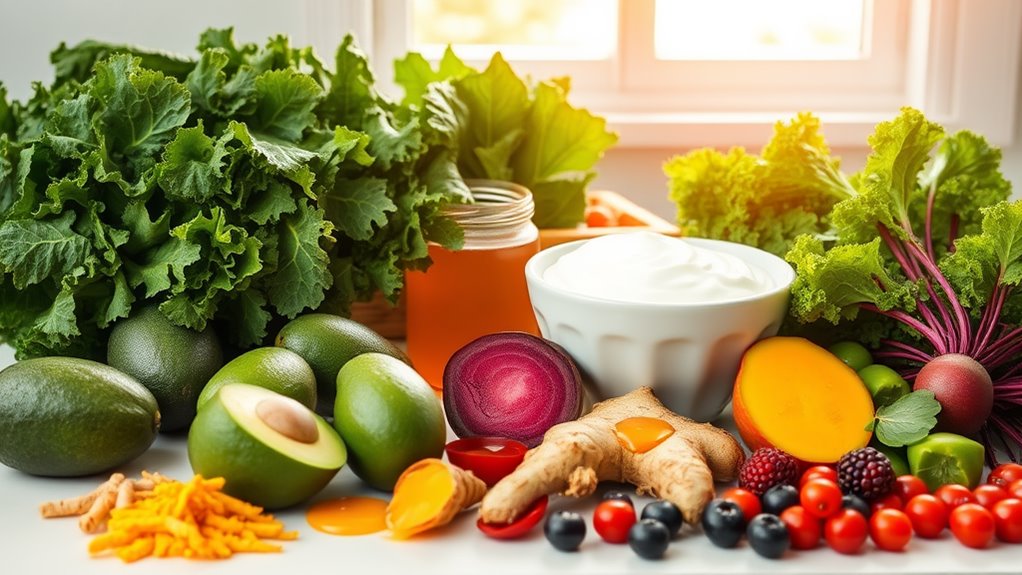How to Heal Your Gut Naturally With These Everyday Foods
Many people underestimate the power of their gut health, unaware that it influences everything from immunity to mood. By incorporating specific everyday foods into your diet, you can naturally support and heal your gut. Fermented options, prebiotic-rich choices, and anti-inflammatory ingredients play crucial roles in this process. Curious about how to effectively integrate these foods into your meals for optimal gut health? Let’s explore the best options available to you.
The Importance of Gut Health
Why should you care about your gut health?
A well-functioning gut is crucial for digestion, immunity, and even mental health.
When your gut’s in balance, you absorb nutrients more effectively and feel energized.
Incorporating gut healing foods like leafy greens, avocados, and bone broth can help restore your gut lining and promote a healthy microbiome.
These foods provide essential nutrients that support the growth of beneficial bacteria.
Prioritizing your gut health isn’t just about avoiding discomfort; it’s about enhancing your overall well-being. Additionally, consuming natural foods that are rich in probiotics can further enhance gut flora diversity.
Fermented Foods for a Healthy Microbiome
Incorporating fermented foods into your diet can significantly enhance your gut health and support a thriving microbiome. These foods are rich in probiotics, which help maintain a balanced gut flora. Regular consumption can improve digestion and boost your immune system. Additionally, fermented foods can help alleviate symptoms of digestive disorders and promote overall wellness.
| Fermented Food | Health Benefits |
|---|---|
| Yogurt | Enhances digestion, boosts immunity |
| Sauerkraut | Rich in vitamins, supports gut health |
| Kimchi | Anti-inflammatory, aids digestion |
Adding these delicious options to your meals can foster a healthier gut environment. Experiment with different varieties to find what you enjoy most!
Prebiotic Foods to Nourish Your Gut
To support your gut health, incorporating prebiotic foods into your diet is essential. Foods like garlic, onions, bananas, and asparagus not only feed beneficial gut bacteria but also enhance your overall digestive function. Additionally, these foods play a crucial role in promoting beneficial bacteria, which can lead to improved gut health and better nutrient absorption.
Top Prebiotic Foods
Prebiotic foods play a crucial role in supporting gut health by feeding the beneficial bacteria in your microbiome.
Incorporate foods like garlic, onions, and leeks into your meals; they’re rich in inulin, a potent prebiotic.
Bananas, especially when slightly green, provide resistant starch, while asparagus and artichokes offer fiber that nourishes gut flora.
Whole grains, such as oats and barley, are excellent sources too.
Don’t forget legumes like lentils and chickpeas, which are fiber-packed.
Benefits of Prebiotics
Nourishing your gut with prebiotics offers a multitude of benefits that can enhance your overall health.
These non-digestible fibers feed the beneficial bacteria in your gut, promoting a balanced microbiome.
A healthy microbiome can improve digestion, boost your immune system, and even elevate your mood.
Research shows that prebiotics can help reduce inflammation and may lower the risk of chronic diseases like diabetes and heart disease.
Incorporating foods like garlic, onions, and bananas into your diet is an easy way to reap these benefits.
Bone Broth: A Nutrient-Dense Healing Option
Bone broth is a powerhouse of nutrients that can significantly support gut healing.
Rich in collagen, amino acids, and minerals, it helps repair the gut lining and reduces inflammation.
When you consume bone broth, you’re providing your body with glycine, which promotes digestion and supports the production of stomach acid.
Additionally, the gelatin in bone broth aids in sealing leaky gut and improving nutrient absorption.
To reap these benefits, make your own by simmering bones with vegetables and herbs for at least 24 hours.
Incorporating bone broth into your diet is a simple, effective way to enhance your gut health. Furthermore, it also provides essential minerals that play a crucial role in maintaining a balanced gut microbiome.
Anti-Inflammatory Foods to Support Digestive Wellness
In addition to bone broth, incorporating anti-inflammatory foods into your diet can significantly enhance digestive wellness.
Foods like turmeric, ginger, and leafy greens are rich in antioxidants and can help reduce inflammation in the gut. Omega-3 fatty acids found in fatty fish and flaxseeds also play a crucial role in gut health by lowering inflammatory markers.
Fermented foods such as yogurt and sauerkraut contain probiotics, promoting a balanced microbiome. Including anti-inflammatory healing foods in your meals can further optimize your digestive health.
By regularly including these foods in your meals, you’ll not only support your digestive system but also improve your overall health.
Make these nutrient-dense options a staple in your diet for better gut health.
Hydration and Its Role in Gut Health
Staying properly hydrated is crucial for your gut health, as water aids in digestion and nutrient absorption.
Additionally, maintaining a balance of electrolytes supports optimal gut function and can help prevent discomfort.
Incorporating herbal teas can further enhance hydration and provide additional digestive benefits.
Water’s Impact on Digestion
How does hydration influence your gut health?
Proper hydration is essential for maintaining a healthy digestive system.
Water aids in breaking down food, enabling nutrient absorption and preventing constipation.
When you’re well-hydrated, your body produces sufficient digestive juices, which help process food efficiently.
Dehydration can lead to sluggish digestion and uncomfortable bloating.
Aim for at least eight glasses of water daily, adjusting based on your activity level and climate.
Incorporating hydrating foods like fruits and vegetables can also support your fluid intake.
By prioritizing hydration, you’ll promote optimal gut function and overall health.
Make water your go-to drink for digestive wellness!
Electrolytes and Gut Function
What role do electrolytes play in maintaining a healthy gut?
They’re essential for hydration and muscle function, including the muscles in your digestive tract.
When you’re dehydrated, electrolyte levels drop, which can slow down digestion and lead to constipation.
Sodium, potassium, and magnesium help regulate fluid balance, ensuring nutrients are absorbed effectively.
Including electrolyte-rich foods like bananas, avocados, and leafy greens in your diet can support gut function.
Moreover, drinking water infused with electrolytes can enhance hydration, promoting regular bowel movements and overall gut health.
Prioritize these nutrients to keep your digestive system running smoothly.
Herbal Teas Benefits
Maintaining hydration is a key factor in promoting gut health, and herbal teas can be a flavorful way to support this.
Herbal teas, such as chamomile and peppermint, aren’t only soothing but also help maintain optimal fluid levels.
Proper hydration aids digestion, supports nutrient absorption, and helps prevent constipation.
Additionally, certain herbal teas possess anti-inflammatory properties, which can benefit your gut lining.
Incorporating a variety of herbal teas into your daily routine can enhance your overall hydration and contribute to a healthier gut.
Just remember to listen to your body and choose the teas that work best for you.





